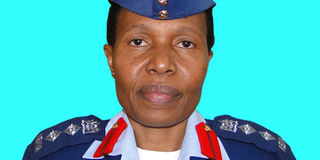Duty of news writers and editors is to clarify and explain, and this can annoy readers

Fatumah Ahmed, Kenya’s first female major-general. PHOTO | FILE | NATION MEDIA GROUP
What you need to know:
“It is sexist to point out someone’s sex before passing on the required information about them,” the incensed blogger decreed with the zeal and certainty of an evangelist.
Bloviating beyond one’s expertise is every blogger’s prerogative, but in this case she is wrong.
Ms Ahmed made history precisely because of her gender, and referring to it in a headline makes perfect sense.
If there are changing public attitudes about the adjective “female” (as in “female student” or “female artist”), Oxford has not made any note of that, and some of the world’s best newspapers do not recognise this usage as “socially inappropriate”.
The best writers avoid the obfuscating language of activists and politicians.
Copy editors who process stories for publication in the Nation and on its website receive much flak from readers (some of it justified).
Part of the criticism is that sometimes we are insensitive in the way we use language.
Two barbs aimed at us recently demand a response, which will serve to illuminate how we approach language issues in our work.
Back in August this year, a cultural expert threw rocks at us (figuratively speaking), accusing us in a blog post of being “sexist” because we had referred to a recently promoted military officer, Ms Fatumah Ahmed, in a headline as the “first female brigadier”.
FIRST FEMALE BRIGADIER
“It is sexist to point out someone’s sex before passing on the required information about them,” the incensed blogger decreed with the zeal and certainty of an evangelist.
“It implies that something is out of place with the social order.” She went on: “Using the word ‘female’ in place of ‘woman’ in all contexts, except for clinical or educational purposes, is meant to demean and is applied in contempt.”
Here, the blogger presents her propositions as facts — so indisputable are these “facts”, she implies, that only “Neanderthals” (her word) would fail to understand what she is saying.
Bloviating beyond one’s expertise is every blogger’s prerogative, but in this case she is wrong.
Ms Ahmed made history precisely because of her gender, and referring to it in a headline makes perfect sense.
WHAT THE DICTIONARY SAYS
Also, the Oxford English dictionary and the practices of seasoned writers and editors at high-quality publications that we read regularly are on our side.
Moreover, the phrase “woman brigadier”, though politically correct, clashes with our understanding of English grammar, and the blogger herself acknowledges that bit.
The standards editor of what is regarded by many as the best English-language newspaper in the world, The New York Times, for example, advises the paper’s writers and editors to use “female” instead in this context.
His reasoning, paraphrased, is that we would not say “man brigadier”, would we? “Woman brigadier” may please the constituency of feminist readers, but it is naïve for anyone to expect writers and editors to adopt without question the political language of special-interest groups.
POLITICAL AGENDA
On matters of language, we take direction from the best in our business, not from activists and others with a political agenda.
And that brings us to another critic of our work, who told Public Editor Peter Mwaura (Daily Nation, November 13, 2015) that “it’s important the editors keep abreast [of] changes in language and contemporary terminologies”.
At issue in this case is the use of the phrase “the disabled” to refer to people with various disabilities.
The critic, identified as a law lecturer, says the term offends the people it refers to and “stigmatises” them. The clunky and stilted phrase “persons with disabilities” is suggested as a better alternative!
PERSONS, PEOPLE, AND DISABLED
Again, we disagree, and we defer to the authority of Oxford and the practices of writers in exemplary newspapers, including the Sunday Times of South Africa, The New York Times, The Telegraph, and The Guardian in the UK, all of which routinely use the term “the disabled”, presumably because there is no better alternative.
Regarding the plural noun “persons” (which I do not use and which sounds unnatural on my tongue), it should be pointed out that outside formal and legal contexts, and in cases where a reporter is quoting someone else, the best writers do not use it in news articles as a synonym for “people”.
From Oxford: “The words people and persons can both be used as the plural of person, but they have slightly different connotations. People is by far the commoner of the two words and is used in most ordinary contexts. Persons, on the other hand, tends now to be restricted to official or formal contexts.”
On the word “disabled”, our stylebook suggests being “specific when describing a disability” and recommends avoiding “generalising people as the handicapped or the disabled”, but it does not offer an alternative word for a community of people with various disabilities.
The substitute suggested by activists for the disabled does not cut it, in our view.
The best writers avoid the obfuscating language of activists and politicians. A writer’s job is not to obscure reality with borrowed, politically correct euphemisms but to clarify and explain it. And the copy editor’s role is to help the writer achieve that lofty goal.
Mr Gekonde is an editor at Nation Media Group.





